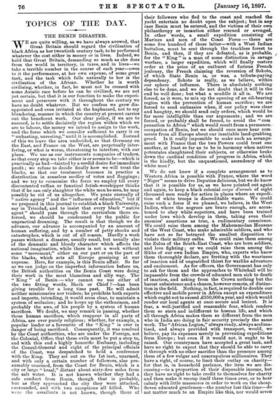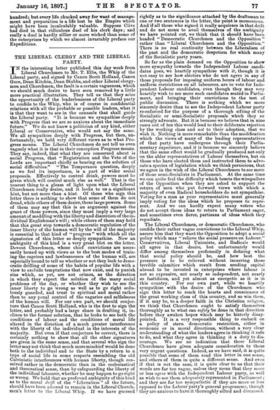TOPICS OF THE DAY.
THE BENIN DISASTER.
WE are quite willing, as we have always avowed, that Great Britain should regard the civilisation of black Africa as her twentieth century task, to be performed whatever the cost either in money or in lives. Indeed, we hold that Great Britain, demanding so much as she does from the world in territory, in taxes, and in lives—we take a terrible number in the course of each year—owes to it the performance, at her own expense, of some great task, and the task which falls naturally to her is the civilisation of the African. Whether he is worth civilising, whether, in fact, he must not be crossed with some Asiatic race before he can be civilised, we are not yet certain, but that it is our function to make the experi- ment and persevere with it throughout the century we have no doubt whatever. But we confess we grow dis- appointed and even irritated at the haphazard, not to say blundering, manner in which the country at present carries out the beneficent work. Our clear policy, if we are to succeed, is to settle decisively the region within which we are to labour, the money we intend to assign to the work, and the force which we consider sufficient to carry it on " unhasting, unresting," until it is accomplished. Instead of this we leave the area undecided, so that Germany on the East, and France on the West, are perpetually inter- fering, or what is worse, threatening to interfere, with our plans. We use as our instruments companies of traders, so that every step we take either is or seems to be—which is practically as bad—tainted by a sordid desire for immediate profit ; we refuse to decide finally how we will treat the blacks, so that our treatment becomes in practice a distribution in senseless medley of votes and floggings ; and we try to economise the force we employ till every discontented ruffian or fanatical fetish-worshipper thinks that if he can only slaughter the white men he sees, he may possibly be rid of us altogether. We prate eternally of "native agency" and the "influence of education," but if we proposed in this journal to establish a black University, say in Trinidad, and to insist that every black "native agent" should pass through the curriculum there en- forced, we should be condemned by the public for unpractical dreaming. The result is that though we do advance, our advance is accompanied by an amount of human suffering, and by a number of petty shocks and catastrophes, which is out of all reason. Hardly a week passes without a disaster, usually small, but usually also of the dramatic and bloody character which affects the national imagination, while there is not a week without some "movement," either on our part or on the part of the blacks, which sets all Europe gossiping at our expense. Here, for example, is this Benin affair. So far as we can judge on the imperfect information before us, the British authorities on the Benin Coast were doing their work in the most blameless and silly way. The " King " of Benin — why cannot we use either of the two fitting words, Sheik or Chief ?—has been giving trouble for a long time past. He will admit neither missionaries nor traders; he prohibits both exports and imports, intending, it would seem clear, to maintain a system of seclusion; and he keeps up the enthusiasm, and probably the awe, of his people by a system of human sacrifices. We doubt, we may remark in passing, whether these human sacrifices, which reappear in all parts of Africa, are ever purely religious ; whether, for example, a popular leader or a favourite of the " King " is ever in danger of being sacrificed. Consequently, it was resolved by the Coast authorities, who are under the Foreign, not the Colonial, Office, that these evils must be put a stop to, and with this end a highly honorific Embassy, including the Consul-General and eight of the principal officials of the Coast, was despatched to hold a conference with the King. They set out on the 1st inst., unarmed, and with only a certain number of followers, also pre- sumably unarmed, from the Coast for Benin, which is a city or large "kraal," distant about sixty-five miles from the salt water. It is not known whether they had a safe conduct from Benin, though that is probable, but as they approached the city they were attacked, surrounded, and with two exceptions all killed. Who were the assailants is not known, though those of their followers who fled to the coast and reached the yacht entertain no doubt upon the subject; but in any case Benin must be entered, and the victims of their own philanthropy or incaution either rescued or avenged. In other words, a small expedition consisting of Marines and men of the Coast Force — there are some five hundred of these latter—with a West Indian battalion, must be sent through the trackless forest to Benin, and then, if they are defeated, as is probable; for the " King " is a man of some distinction in savage warfare, a larger expedition, which will finally restore order at the price of an outburst of furious French jealousy, the French claiming the reversion of Sokoto, of which State Benin is, or was, a tribute-paying dependency. Sokoto is really, as we believe, within our sphere of influence. There is absolutely nothing else to be done, and we do not doubt that it will in the end be well done; but what a muddle it all is. We are forced, as it were, to mix up the opening of an oil-bearing region with the prevention of human sacrifice; we are forced to send embassies when, if our policy were clear and haughty, we should send only orders, which would be far more intelligible than our arguments ; and we are forced, or probably shall be forced, to avoid the "corn pensation to Africa" which would result from a permanen:• occupation of Benin, lest we should once more hear corn. ments from all Europe about our insatiable land-grabbing greed. Is it really impossible to make such an arrange- ment with France that the two Powers could trust one another, at least so far as to be in harmony when natives potentates slaughtered their subjects, or otherwise broke down the cardinal condition of progress in Africa, which is the kindly, but the unquestioned, ascendency of the white man ?
We do not know if a complete arrangement as to Western Africa is possible with France, where the word "Niger" seems to drive Deputies delirious, but we do know that it is possible for us, as we have pointed out again and again, to keep a black colonial corps d'armee of eight thousand men ready for action in places where an expedi- tion of white troops is discreditable waste. We could raise such a force if we pleased, we believe, in the West Indies, where the negroes are brave enough, are accus- tomed to obey white superiors, and have been trained under laws which develop in them, taking even their enemies' assertions as true, a rudimentary conscience. We could raise them among the Mahommedan Houssas. of the West Coast, who make admirable soldiers, and who have not so far betrayed the smallest disposition to violate their military oaths. We could raise them among the Zulus of the South-East Coast, who are born soldiers, and love fighting ; or we could raise them among the Sikhs of our own Indian Empire, who, experts who know them thoroughly declare, are fretting with the weariness of inaction and of ungratified thirst for warlike adventure and excitement. As for officers, the Government has only to ask for them and the approaches to Whitehall will be impassable from the crowds of educated men sick to death. of inaction, and asking from the Crown nothing but the barest subsistence and a chance, however remote, of distinc- tion in the field. Nothing, in fact, is required to double our effective and mobile power in Africa except an expenditure which ought not to exceed .R350,000 a year, and which would render our local agents at once secure and lenient. It ie fear, a well-justified and reasonable fear, which renders them so stern and indifferent to hnznan life, and which all through Africa makes them so different from the men who in India are doing in fair security precisely the same work. The "African Legion," always ready, always acclima- tised, and always provided with transport, would, we believe, pay its expenses merely in preventing expeditions from Europe ; but even if it would not, it ought to be raised. Our countrymen have accepted a great task, and have no right to expect that they should be able to carry it through with no other sacrifice than the presence among them of a few vulgar and unscrupulous millionaires. They have a right, of course, to limit their outlay on charity— for that is, in household parlance, the item we are dis- cussing—to a proportion of their disposable income, but they have no right to take credit to themselves for charity and then make it recoup itself three times over, or to bear calmly with little massacres in order to work on the cheap. Seven educated gentlemen—the number lost this time—do not matter much to an Empire like this, nor would seven hundred; but every life chucked away for want of manage- ment and preparation is a life lost to the Empire which might have been incalculably valuable. Suppose Clive had died in that ridiculous duel of his clerk days ; and really a duel is hardly sillier or more wicked than some of the enterprises by which we almost invariably preface our Expeditions.







































 Previous page
Previous page